by Hermione Lai , Interlude
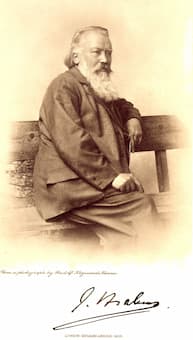
Johannes Brahms
Johannes Brahms would not do well on Facebook, Twitter, or TikTok, that’s for sure. Of course, he is one of the most widely performed and beloved composers of all time. In the historiography of music, he stands alongside Johann Sebastian Bach and Ludwig van Beethoven as one of the shining testaments to human inspiration and creativity. I have always had a love-hate relationship with the music of Brahms. On one hand, his music seems very tightly constructed, almost like a textbook on counterpoint and harmony. But that’s only part of the equation, as “the lush and organically grown surface of the music” is full of emotional intensity. So what do I hate about his music? Well, Brahms doesn’t seem to want to communicate what those feelings are all about. It’s almost impossible to get a sense of what he is trying to express or what inspired him. Being intensely private, his biography is probably not written into his music, and he always gives his compositions very bland and generic titles. Since there seems to be no direct way of accessing his private thoughts and emotions, maybe we can get a glimpse of his personality by looking at his relationship with his family?
The Mother: Christiane Brahms
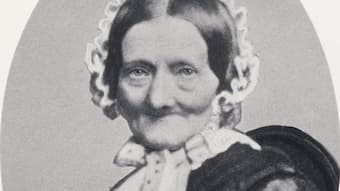
Christiane Brahms
Johanna Henrike Christiane Nissen came from a line of town-councilors, pastors and teacher, and her mother’s side could be traced back in the fourteenth century. Her father had been a tailor, and Christiane later wrote, “I was sent out to earn money as a seamstress when only 13, and often continued to sew at home until midnight.” At the age of 19 she was employed as a maid in a private household for 10 years, and subsequently resumed her work as a seamstress, working for a Hamburg firm for eight years. When her sister married the longshoreman Johann Detmering in 1827, Christiane moved in with them and helped to sell sewing good at a little shop called “Nissen Sisters-Dutch Wares.” Christiane is described as “small, sickly, gimpy from a short leg, plain of face with enchanting blue eyes.” Apparently, she was also a complainer but “modest and kind-hearted and by no means an unintelligent woman with an interest in literature.” To earn extra money, the Detmering household also took in lodgers, and in 1829 a handsome young musician by the name Johann Jakob Brahms took up residence. He is described “as a poor but fine-looking figure of a man, with a handsome forthright face and flowing brown hair; and his dark gray eyes were roguish and merry.”
The Father: Johann Jakob Brahms
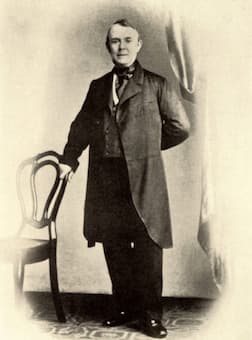
Johann Jakob Brahms
Johann Jakob Brahms hailed from Holstein, and showing great musical aptitude decided on a career in music at an early age. His father refused to allow his son to study an instrument, and thus he secretly took music lessons and started playing with local musicians. When his musical secret was discovered, Johann Jakob ran away from home. Undeterred he learned to play several instruments, including the violin, viola, cello, flute, and flugelhorn and made his way to Hamburg in 1826. Initially, he made a squalid living by playing as a street musician, and occasionally with little bands in drinking establishments. Johann Jakob soon concentrated his efforts on the double bass, and for many years he would perform in a sextet at the popular Alster Pavilion, as well as in the orchestras of the Stadtheater and the Philharmonic Society. Granted Hamburg citizenship in 1830, he swore to “honor and decently represent the city,” and since he was now a wage-earning citizen, he started to look for a bride. One week after he had moved into Ulrikusstrasse and having laid eyes on Christiane, he declared his wish to marry her. “The precipitous proposal surprised the prospective bride, not least because, at 41, she was 17 years older than her suitor.” I think Christiane received a good talking to from her brother-in-law, who told her to accept the proposal; after all, it was her last chance of a home, children, and happiness.
The Marriage
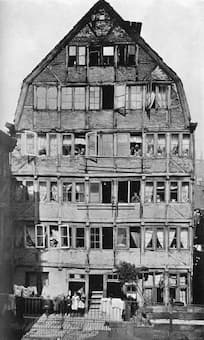
Birthplace of Brahms: No. 24 Specksgang, later renumbered to No. 60 Speckstraße, Hamburg
In a letter to her son Johannes shortly before her death, Christiane wrote, “And so, I considered it Destiny.” Christiane and Johann Jakob were married on 9 June 1830. Their first years appeared to have been reasonably happy, although they initially lived in extremely humble circumstances. Contrary to statements by the Brahms biographer Max Kalbeck, “Johann Jakob’s earnings, though modest, placed him and his family well above the poverty line. Far from being indicative of impoverished circumstances, the frequency with which he changed accommodations, no fewer than eight or possibly even nine times between 1830 and 1864 was, in fact usually prompted by a desire for larger and more expensive apartments.” In 1833, the family moved to a “ramshackle half-timbered house on Specksgang—Bacon Lane—in the Gängeviertel.” That district was well known for its sailor’s dancehalls that doubled as brothels. The family probably lived on the first floor in two very small and low-ceilinged rooms. One room was probably a combined kitchen and entrance, and the other a sitting room with a sleeping closet. There was no bathroom or running water, with people drinking unfiltered water from the canals. When a sanitation inspector entered the area as late as 1892, he wrote, “I have never seen such unhealthy places, pest-houses, and breeding-places for every infection… I forget that I am in Europe.” It was from that location that on 7 May 1833, a proud father announced the birth of a healthy son, which he named Johannes.
The Sister: Elise Brahms
Although Christiane was already in her early 40s, the marriage bore three children with Elisabeth (Elise) Wilhelmine Louise born on 11 February 1831. The child was afflicted with chronic migraine headaches that could keep her in bed for weeks. She is described as “looking a good deal like her brother but without the aura, the penetrating intelligence in the eyes, or the sheer attractiveness.” Because of her sickly constitution, she seemed to have been content to play her role as a “semi-invalid and patient virgin” and essentially helped with various housekeeping tasks. “She adored flowers and birds, shiny floors and tidiness, and entertaining friends.” Her mother affectionately called her “the fat dumb peasant.” Elise had no musical talent but was highly interested in Johannes’ activity and she took great pride in his growing reputation. “Her deep affection is reflected in her numerous letters to him, more than 200 of which have survived.” In turn, Brahms always spoke and wrote affectionately to his sister and took on a protective and counseling role. This was certainly the case when Elise, at the age of 40, was looking to marry Johann Georg Grund, a clockmaker, and widower with six children. Johannes tried to dissuade his sister and even offered to buy her a place in a residence for unmarried or widowed women. Elise, however, had made up her mind and Johannes continued to provide financial help to his sister during her marriage.
The Brother: Fritz Brahms
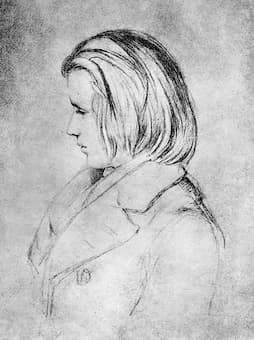
Johannes Brahms at age 20
Fritz Brahms, born on 26 March 1835 was known around town as “the wrong Brahms.” This already gives us some idea about the relationship between the Brahms brothers. To be sure, Fritz was reasonably bright and talented, but he “had the difficult task psychologically to live in the shadow of the golden child.” Initially, his father wanted to turn Fritz into an orchestral player but the boy resisted. Although he studied violin with the Concertmaster of the Hamburg Philharmonic Orchestra, he eventually gave up playing that instrument and sold his violin in 1856. Instead, and following his brother, he took up the piano and studied with Otto Cossel and Eduard Marxsen. However, he seems to have soon realized that he was not really equipped for a career as a professional pianist. Clara Schumann heard him perform and wrote, “On the whole, though, he possesses quite a good technique, only I find his playing so very dull.” Fritz eventually established himself as a respected music teacher in Hamburg, and for a time, he was also active as a piano teacher in Caracas, Venezuela. The two brothers never really got into big drawn-out fights, as most of the time, Johannes simply ignored Fritz. As time went on, the relationship became more strained, and Johannes wrote to his father in 1871, “I am not staying with you on my forthcoming visit to Hamburg because of Fritz. I have told Fritz how I feel. If he has nothing to say to me, nothing by way of explanation, I really don’t see why I should see him.” However, during the last 10 years of Fritz’s life, in which he experienced increasingly ill health, Johannes repeatedly provided him with financial assistance.
The Estrangement
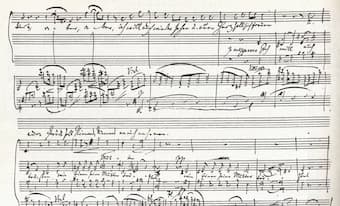
Brahms: A German Requiem
The considerable differences in temperament and ages of Johannes’ parents had little consequence at first, but became increasingly burdensome as time went on. When Johann Jakob was still a robust man in his early 50s, Christiane had become an old woman. She was described as “having faded into a little old withered mother who busied herself unobtrusively with her own affairs, and was not known outside her dwelling.” In the weeks before her death, Christiane wrote a long letter to Johannes, “so that I can die in peace, knowing that my child has no false ideas about me.” She accuses her husband of meanness toward her and her children, and of having made her life unnecessarily hard throughout their marriage.” Specifically, she accused her husband of having lost a good deal of the family savings by playing the lottery, and by making expensive purchases for his own comfort and pleasure.
There had always been a strong bond between mother and son, as she wrote, “I never forget you when I pray in the evening, and when I get up in the morning, my first thought is of you.” And Johannes wrote to Clara, “How marvelous it is to be staying with my parents! I wish I could take my mother everywhere with me.” And when he saw her after her death he said, “She was quite unchanged and looked as sweet and gentle as in life.” Brahms was greatly saddened by the mutual resentment experienced by his parents, and he initially sought to bring about reconciliation. Ultimately, he accepted the separation and he did not take sides in the dispute. As he wrote to his father, “Believe me that no son can love his father more deeply than I do and that no one can feel the sadness of our position more keenly and sincerely than, unhappily, I now do.” Brahms even rented and paid for an apartment and his sister, with a separate room for his father. Sadly, Christiane suffered a stroke and died in 1865. Brahms later denied that his Requiem was inspired by his mother’s death, but he must certainly have had her in mind when he wrote the fifth movement to the text, “I will comfort you, as a mother comforts her child.”
The Stepmother: Karoline Louise Brahms
One year after his mother’s death, his father married Karoline Schnack. She also hailed from Holstein, and had been married and widowed three times. Karoline was 18 years younger than Johann Jakob, and Johannes felt no resentment towards his stepmother but seemed to have been happy for his father. As he wrote to him, “Give my regards to the future mother and tell her, she could not have a more grateful son than me, if she makes you happy.” By all accounts, Karoline was an extremely kind-hearted, cheerful, and capable woman, “experienced in running a household efficiently.” All too soon, however, Brahms got news of his father’s grave illness. Johann Jakob had been ailing for the better part of a year and was forced to resign his post at the Philharmonic. Although Johann Jakob did not complain of any particular symptoms, a physician diagnosed cancer of the liver. Johannes apparently spent “the next fortnight at the bedside of the stricken man, whom he watched with tender care and tried to cheer with loving encouragement.” Johan Jakob died on 11 February 1872 in the presence of his wife and two sons.
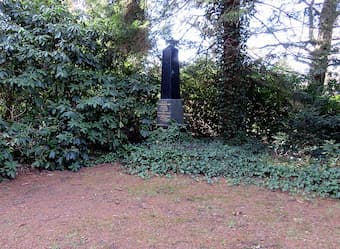
Grave of Caroline Brahms
Brahms wrote to Karoline shortly after his father’s death, “I can’t attempt to try to console you. I know all too well what we have lost and how lonely your life has become. But I hope that you are profoundly and doubly conscious of the love which others have for you, the love of your son Friedrich, of your admirable sister and her children, and lastly my own love which belongs to you fully and entirely.” Brahms provided lodgings for his stepbrother Friedrich and his mother in the country town of Pinneberg, and Friedrich continued to carry on his clock-making business. “He established himself in a pleasant shop, providing him with all the requisites for a new start, and wished to guarantee a comfortable home for Frau Karoline.” However, Karoline did not enjoy country life and returned to Hamburg to run her own lodging business. Brahms repeatedly sent her money, and he did visit his stepmother whenever he was in Hamburg. In fact, in his will, he left her a life annuity of 5,000 marks.
Conclusion
To many commentators, “Brahms’ psychological depths remain a mystery.” As we have seen in his dealings with his family and friends, Brahms could be fantastically loyal and generous, but also unpleasant, secretive, occasionally mean-spirited, and full of irony and reserve. If his personality seems contradictory and conflicted, he found his balance in his compositions. As a scholar writes, he “deftly couched his romantic, melodious, emotional music in the classical form, creating a protective boundary that contained the emotionalism of his compositions in an articulated form and structure.” Brahms was socially awkward yet he could emphasize with poor, and hard-working people, and he loved children. I think that contentment and romanticized perfection, aspects that eluded him in his personal life, found a clear and sublime outlet in his music. It’s probably much more complicated than that, but to my mind, it does explain a lot.